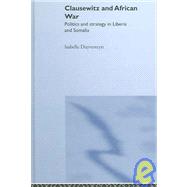- ISBN: 9780714657240 | 0714657247
- Cover: Hardcover
- Copyright: 12/2/2004
Oil, diamonds, timber, food aid, these are some suggestions that have been put forward as explanations for why people have fought in African wars in the past decade. Another set of suggestions focuses on ethnic and clan considerations. These economic and ethnic or clan explanations contend that wars are specifically not fought by states for political interests with mainly conventional military means, as originally suggested by Carl von Clausewitz in the nineteenth century. Clausewitz's conception of war consisted of three elements, the government, the army and the people. The government has ultimate authority over the army, which functions as its instrument with the support of the population. This is also called trinitarian war. In the non-trinitarian explanations, such as the resource and ethnic arguments, wars are more likely fought by non-state entities, such as warlords. They fight for very personal and particularistic interests. Military force is not always used to achieve an aim but often for itsown sake. When military force is used as an instrument it is in an indirect and irregular manner. This study aims to prove that the interpretation by Clausewitz is still applicable to these so-called resource and ethnic wars. With the aid of empirical material from two counter-intuitive case studies, Liberia (1989-1997) -which has been often qualified in both ethnic and resources terms- and Somalia (1988-1995) -which has been categorized as a clan war with resource interest playing role through food aid - this study aims to prove the continuing validity of Clausewitz's ideas of trinitarian war. This study shows that alternative social organizations to the state can be seen as political actors and use war as a political instrument, analogous to the trinitarian concept of war. In addition armed force is used, which is more conventional than anything else. Social organizations other than the state are thus shown to be political actors that fight for political interests with the aid of military force,which is employed in a conventional manner.







